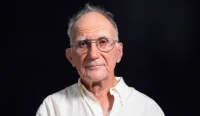I wanted to figure out why people commit violence

Download image
Jan Volavka was born on December 29, 1934 in Prague. Both parents were well-known art historians. Mother Hana, née Frankenstein, was of Jewish origin. She was partially protected by a mixed marriage during the war. John himself was classified by the Nazi laws as a first-degree Jewish half-breed. At the beginning of 1944, his father Vojtěch Volavka and his son Jan tried to flee to Turkey, but they were arrested and ended up in the prison in Uherské Hradiště. Nine-year-old Jan spent three weeks in a Nazi prison; his stay there formulated his later career. His father was deported to the labour camp in Bystřice u Benešov, his son returned to Prague. After his mother was also deported to Terezin in February 1945, ten-year-old Jan remained alone at home. Fourteen days later, his mother’s friend Elsa Kučerová took charge of him and he spent the rest of the war in her care. In 1953-59 Jan Volavka graduated from the Medical Faculty of Charles University. On August 22, 1968, he and his wife emigrated and he became a recognized psychiatrist and expert in the neurobiology of violence in the United States. He is Professor Emeritus of the New York University School of Medicine.

